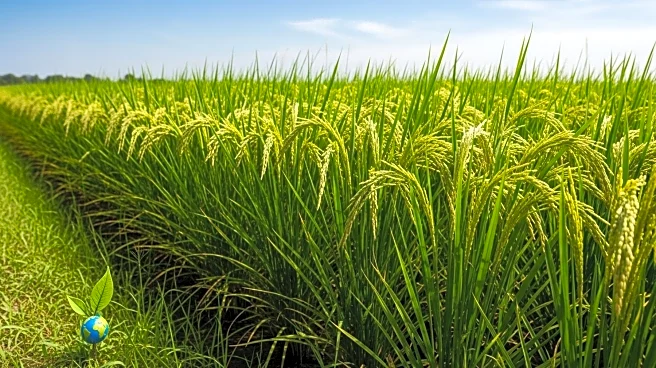What is the story about?
What's Happening?
BASF has shared new findings from its Global Carbon Field Trials, conducted in collaboration with the International Rice Research Institute (IRRI), demonstrating a 30% reduction in greenhouse gas intensity in rice cultivation without compromising yield. The trials, initiated in 2024 in the Philippines, tested climate-smart technologies such as alternate wetting and drying, direct seeded rice, and improved straw management. These practices significantly reduce emissions and freshwater use in rice farming. BASF's AgBalance Life Cycle Assessment model proved effective in estimating on-farm emissions, enabling farmers to access carbon markets and potentially add value to their operations.
Why It's Important?
The findings from BASF's trials are crucial for addressing the environmental impact of rice cultivation, which contributes around 10% of agricultural greenhouse gas emissions. By implementing climate-smart practices, rice farmers can reduce emissions while maintaining productivity, supporting global food security. The trials highlight the potential for farmers to adopt new business models like carbon markets, providing additional revenue streams. This initiative aligns with BASF's broader commitment to reduce CO2e emissions in agriculture by 30% by 2030, emphasizing the importance of collaboration across the value chain to achieve meaningful climate impacts.
What's Next?
BASF plans to continue its Global Carbon Field Trials, focusing on scaling climate-smart solutions in real-world conditions. The company aims to collaborate with farmers, research institutes, and partners to support the adoption of climate-smart agricultural practices and access to carbon markets. BASF's Global Carbon Farming Program will turn insights into action at scale, working towards reducing emissions in agriculture and supporting farmers in adapting to extreme weather conditions.
Beyond the Headlines
The trials underscore the importance of climate resilience in agriculture, as they help farmers adapt to extreme weather and challenging field conditions. BASF's efforts contribute to a sustainable future for agriculture, integrating economic success with environmental protection and social responsibility. The initiative demonstrates the potential of science-driven partnerships to drive change and support farmers in achieving climate goals.















